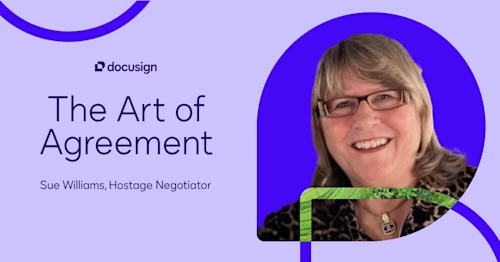
Great Negotiators Listen More than Talk
Sue Williams has negotiated hundreds of kidnapping and hostage-taking incidents—finding ways to reach agreement with the most dangerous people in the world.


🕒 Reading time 5 minutes
Key takeaways
Anyone can learn to be a better negotiator
Start by building empathy
Silence is powerful—use it to your advantage
Over the past 30 years, Sue Williams has negotiated hundreds of kidnapping and hostage-taking incidents—finding ways to reach agreement with some of the most dangerous people in the world. Based in London, Williams also now teaches at Oxford University’s Said Business School, teaching future executives how to apply hostage negotiation techniques to business deal-making.
One of your fellow officers at Scotland Yard thought you’d be a good negotiator because you talk a lot, right?
Yes, but the funny thing is, anybody who knows anything about negotiation knows that that's not actually one of the core skills of being a good negotiator. You've got to be a good listener, not a good talker. It’s about building rapport, listening, taking the other person seriously, getting to the root of the problem, seeking to understand, trying to make yourself understood, and coming up with options. You don't negotiate from your point of view. You've got to step out of your worldview and see the situation from the other side. The only way you're going to solve the problem is if you understand them without judgment.
Even though you’re dealing with some terrible people.
Oh, yeah. Horrendous. Terrorists, murderers. But you put yourself in their shoes, look at the situation through their eyes, ask them questions, respect their replies. You've got to have this mindset of discovery and probing, peeling back the layers of what brought them here to this position today to do something so desperate.
As a negotiator you are not there to judge them or have a political argument. You have to create an atmosphere of positive joint enterprise. You begin by relationship building. You can't just go straight in and fix something, and you can't go straight in to negotiate. There are phases. Fact-finding, relationship building, good communication. I’m always aware of the moment when it flips to negotiation. I don't announce it, but I'm aware of it.
In addition to listening, you say there’s power in silence.
People can be a bit embarrassed by silence. We don't like it. We tend to fill a silence. Create that gap in the conversation, create a few seconds of reflection. Sometimes your counterpart will fill that silence by saying something which perhaps they wish they hadn't said. You can hold that silence, and step back and just watch the other person. It can make you seem a little bit mysterious. It definitely makes you look more confident.
You also talk about empathy—and you distinguish that from sympathy.
There’s a big difference. Empathy is much more personal. It's much deeper. It's a connection. Whereas sympathy is feeling for somebody, but only feeling sorry for them in a way. Empathy builds a bridge. It builds a connection. It values both parties, really, because it's saying, I am listening to you, I understand you.
"You have to prepare. You're not going to walk in and get some divine inspiration. You have to have a structure—not a script, but a structure. And none of this happens quickly."
Negotiation 101: How to Get Better
Were you always good at negotiating? Are some people just naturally good at it?
I was always a bit of a peacemaker. I suppose I can remember even as a child being a peacemaker. But I've also had a lot of training. Some people think that you have to be born a good negotiator—that's not true. Or that you must be born with a charismatic personality and you can naturally get people to like you—that's not true. You can train for all these things.
But a lot of people dread negotiating. Can they learn too?
If it's the word negotiation that worries you, change it. Call it a challenge. Call it a game, call it problem solving. It's just communication. That's all it is.
What do you teach your students at Oxford?
We talk about the questions you’re going to ask, and how you craft those questions that are going to harvest the information that you want and that's going to help you in the negotiation. We talk about emotional detachment, which is really important because there’s passion that you’ll have for this, but sometimes emotion can get in the way.
Also, you have to prepare. You've got to put time in your diary to prepare for it. You're not going to walk in that room and get some divine inspiration. You have to have a structure—not a script, but a structure. And none of this happens quickly.
Often, especially in big negotiations, you’re working as a team—not going it alone.
I'm a great believer in experts. I need a lot of advice in my world. So if I need cultural advice, I go to experts. If I need medical advice, or geography advice, I go to experts. We're doing all our decision making against the backdrop of someone's life. So this is not the time to wing it. You have to respect other people's expertise and get the right experts for this type of work.
What happens when you’re an expert negotiator but the person isn’t?
That's always the most worrying actually, because when you are dealing with kidnappers who have done this before, it's as if they know the process, they know the phases of the negotiation. The more worrying type of kidnap response for me is dealing with somebody who hasn't done this before. You actually have to do more work. You have to tell them what to do, and you have to handhold and get them through it. Also, you have to keep them calm, because if they're not calm, then there could be some unintended consequences, which obviously we want to avoid.
Keeping Up with Change: AI and Crypto
How has the field of kidnap negotiations changed since you began?
In years gone by, a kidnap would be dealt with completely under the radar. In fact, until the hostage was home, some people never knew there even was a kidnap. That's the best environment to work in. But that hasn't happened for decades. There’s so much chat out there now that keeping a kidnap a secret is very, very hard. I would say almost impossible.
What new challenges do you see?
Without a doubt AI. Somebody uses the voice of a loved one to say, "I've been kidnapped. I’m being held." That for me is one of the worrying aspects going forward. Technology just advances what people can do. Another example is how we send money. Obviously there’s cryptocurrency, that's relatively new, and the ability to send money around the world. But for me, the most challenging thing would be AI, and we’re only just beginning to see the foothills of it at the moment.
Do kidnap situations always get resolved successfully?
I wish they did. No, there's a very small percentage who sadly don't make it. Well more than 90% of cases that are reported are resolved successfully. But I should stress: that’s the percentage of cases that are reported. In fact the majority of kidnaps are not reported.
Do people usually pay the ransom?
It's not quite as simple as that, because there are many kidnaps where you are not allowed to pay. It's illegal to pay. You have to look at what else is in the toolbox. What else can you offer people? What other tools of persuasion have you got? That’s one of the things that winds me up when I see my profession depicted in movies. A ransom is not always the answer.
What else do the movies get wrong?
In the movies what I notice is that first of all, there's the distinct lack of paperwork. There's a lot more paperwork in my world. We have to over-prepare, because someone's life's at risk. It’s not like the movies, where they pick up the phone and say, “Talk to me.” Also, in the movies, nobody’s doing a risk assessment. And the negotiator tends to be doing everything, like talking to the families. Whereas in real life, the negotiator has one job, and that's to build rapport and understand the hostage taker. That's your one job. You don't really involve yourself in the other dynamics of the crisis response. You just stay focused on that one job.

Dan Lyons is an author and recovering journalist who has written about technology, work and business transformation.
Related posts
Docusign IAM is the agreement platform your business needs


